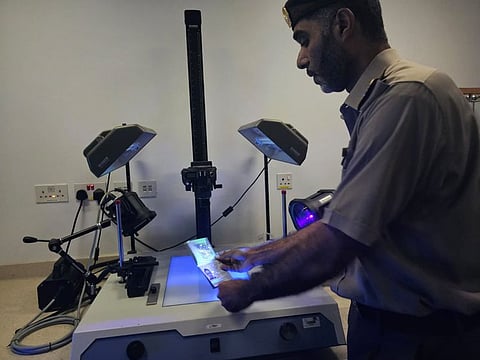Video: Dubai seizes 366 fake passports, travel documents in first quarter of 2024
Last year, 1,232 forgeries were detected and 443 cases were referred to public prosecution

Dubai: From January to March, 366 forgery cases involving fake passports and travel documents were identified at Dubai airport, it was revealed on Monday.
The forgeries were detected by the Document Examination Centre located at Dubai International Airport’s Terminal 1. The Centre is a part of the General Directorate of Residency and Foreigners Affair in Dubai (GDRFA Dubai).
The Centre specialises in the examination of travel-related documents, which include passports and other documents, visas, identification cards, various types of entry permits, and residence cards issued by foreign countries, such as the US Green Card.
Successfully caught
Aqil Ahmad Al Najjar, consultant of the Centre, told Gulf News during a media tour of the Centre on Monday that during the first quarter of this year, the Centre intercepted 366 forgery cases, a slight increase from 355 cases in the same period last year in 2023.
Throughout 2023, a total of 16,127 documents were examined, of which 1,232 were identified as forgeries, and 443 cases were referred to the public prosecution for further action based on the specifics of each case. The violations were caught during the departure process.
High-tech centre
The examination and auditing processes at the centre cover all security features, seals, and electronic chips embedded within the documents. The centre boasts an integrated laboratory equipped with the latest, specialised precision technologies in this field.
The centre utilises modern devices which contains visible and invisible radiation, and devices for reading information stored in passport chips. The centre also has a remote examination device.
Al Najjar explained that electronic passport readers are available to all front-line employees at Dubai Airports, enabling them to efficiently verify the authenticity of all submitted passports and travel documents upon entry or departure.
He said: “GDRFA Dubai is one of the few entities globally with a specialised and accredited Centre for Document Examination. Unlike most immigration departments worldwide that depend on criminal laboratories for inspections and audits—processes that can take days or weeks—Dubai Airports achieves this in a remarkably short time.”
Al Najjar said every passport has 20 security features that can be checked to determine whether it is genuine or not.
The centre uses UV rays to check for other security features like florescent fibres or ink that cannot be spotted with the retro checks.
The recent UAE passport has 19 security features.
Al Najjar said the centre has a huge database of samples of all passports in the world to crosscheck, if needed. Retro checks also take place at the Hatta border.
While spotting fake paper passports is not hard for officers, with the success rate at a high 85 per cent, fake electronic documents are harder to identify.
Fraudsters often manipulate the electronic chip, making it tough for the officers but that is when "advanced technology" comes in helpful.
Al Najjar explained that some travellers also fall victim to gangs that sell passports for large amounts of money.
There was one incident at the transit area when a family of five paid $10,000 each for European passports. They were caught at the transit checkpoint and interrogation revealed that they believed they were genuine documents. The family was sent back to the country they flew in from.
Serving others
Al Najjar said the centre provides its services to all relevant authorities within the country and offers training services to various stakeholders, including airlines and their staff responsible for verifying passenger identities and managing their boarding procedures. Additionally, it assists anyone seeking to authenticate documents, including individuals who acquire passports through intermediaries from foreign countries and wish to confirm their legitimacy.
It also serves those referred by the GDRFA who may need to replace their passports due to nationality changes or update their identity and residence records based on new passport data. Al Najjar also advised those who had plastic surgery to update their passport with a new picture of themselves.
Emirati talent
Al Najjar pointed out that the centre is staffed entirely by Emiratis, who possess extensive experience gained through ongoing training and qualification. This includes around 1,500 passport control officers stationed in Building No. 1, Building No. 2, and Building No. 3, handling entry and exit processes. These officers, often referred to as the first line of defence, are responsible for document verification. Additionally, there are 30 document examiners, known as the second line of defence, who perform detailed audits. All staff members are Emiratis.
Legal consequences
Al Najjar said the checks carried out by the Centre can lead to significant legal consequences for individuals found with forged or counterfeit travel documents. Those departing who are caught with such documents are referred to the country’s judicial authorities, regardless of whether they were knowingly involved or were unwittingly deceived. Meanwhile, individuals arriving with forged documents or passports are denied entry and promptly returned to their originating countries or the relevant authorities.
Humanitarian considerations
Al Najjar said leveraging its extensive experience in handling document and passport forgery and informed by insights into the complexities of many cases as assessed by the public prosecution, the centre has developed a unique perspective on the humanitarian aspects that may be involved. Some individuals may unknowingly become victims of these criminal schemes. Accordingly, the centre implements special procedures that take into account humanitarian considerations when addressing such situations.
Sign up for the Daily Briefing
Get the latest news and updates straight to your inbox



